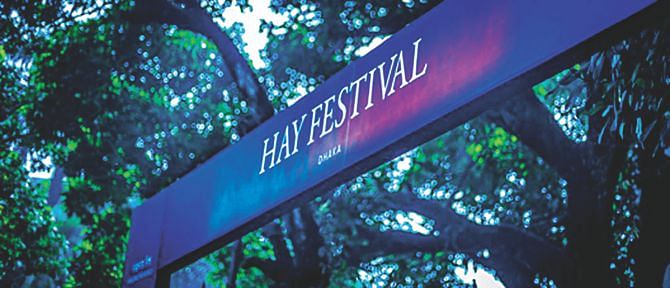HEY, HAY!
HEY, HAY!
EDITOR’S NOTE
"I mark the hours, every one,
Nor have I yet outrun the Sun.
My use and value, unto you,
Are gauged by what you have to do."
—Inscription on Hermione Granger's Time-Turner
With five simultaneous events happening around the Bangla Academy grounds during Hay Festival Dhaka, not to mention the food treats and the cha-adda-sessions at Bottola, one couldn't help but wish for Hermione's Time-Turner! The joy of not missing on anything – watching sparks fly between panelists, listening to the discussions, asking questions, learning, musing…we don't get literary opportunities like this in Dhaka often enough. It seems only appropriate thus that SLR presents three reflections on Hay written by contributors Shahpar Selim, M.K.Aaref and our columnist Nupu Press. Read on, enjoy the different strokes that together illustrate the luminosity of this Literary Festival.
MUNIZE MANZUR

I attended all three days of Hay Festival Dhaka, from the first session to the last, and felt terrifically pleased for being so fully present. Until, that is, I saw photos of the weekend on social media and didn't recognise half the people sitting on stages and talking into microphones. Why did they not look familiar? Who were they? How did I miss them?
Attending sessions back to back as I did, still didn't allow me to catch everything, as there were five events running concurrently every hour. While I watched what turned out to be my favourite panel – Muhammed Zafar Iqbal, Lucy Hawking and Marcus du Sautoy on popularising science – I was sad to be missing Manju Kapur, Nilanjana Roy and Muneeza Shamsie talk to Tahmima Anam about the woman as a writer. Even when I was in my own session demonstrating my storytelling lessons from films, I wanted to see Salil Tripathi over in the next room.
The festival provided a rich dimension to my reading experience. I'm already a fan of historian William Dalrymple's writing, but when he paced the stage and recounted tales from his latest book, Return of a King, I was transfixed. Never mind that I was sitting in a large air-conditioned packed hall in Dhaka, I was transported to nineteenth-century Afghanistan and its ill-fated British occupation.
The festival brought me a more profound understanding of writing. I had recently completed Zia Haider Rahman's novel, In the Light of What We Know, and found it partly brilliant and partly infuriating (certainly by the way women are portrayed by both the male narrators). On stage, he spoke much the way he wrote: starting in one direction, then digressing into tangents that brought forth unrelated factoids and insights that eventually illuminated his original point; he was brilliantly infuriating. Then, right at the end, he said that if the work makes the reader comfortable and happy, then it only serves to keep the world secure; whereas the purpose should be to make one uncomfortable in order to provoke questions. (I paraphrase, and that too in hindsight, so this doesn't quite capture his more lyrical choice of words.) Now, on top of his being compelling and refreshing, I decided he was also infuriatingly brilliant.
The festival introduced me to new voices. Kosal Khiev described his fourteen years in an American prison, where when the lights were turned off at night, the inmates would line up in silence to hear him tell stories. These stories, inspired by an in-house programme, went on to become the spoken word poetry that he now shares around the world. He may have been born in a refugee camp in Thailand, and deported to Cambodia after his time in prison, but the poet was so infectiously buoyant and life affirming, my spirits soared in wonder and appreciation.
Lastly, given my otherwise hermetic existence, the festival gave me the opportunity to meet people, reminding me yet again of the importance of physical presence and connections. There were friends I hadn't seen in months due to conflicting schedules. There were those I had known only virtually via my blog and social media, whom I was finally able to meet in person. There were those I had known in previous chapters of my life, like the then-agent and now Group Editor-in-Chief of Bloomsbury, Alexandra Pringle, who had been the first to read my early manuscript in London. I had described the incident in this paper some months back, never imagining that I would meet her again sixteen years later in Dhaka. The festival was large enough for surprises such as this but, critically, intimate enough to allow everyone to mingle and meet.
I hope Dhaka Hay doesn't expand much more than its current scale. This year proved it's more than ample in its vision, depth and breadth. Any bigger, and I'll no doubt look at images after the festival is over, at all the events and people I don't recognise, because I could only be at one place at one time, and wonder if I missed it all. And it's much too thrilling and rewarding to do that.
Nupu Press is a writer and film producer. Her blog is at www.nupupress.com